西方文化导论Unit1PPT精品文档
西方文化导论Unit.pptx
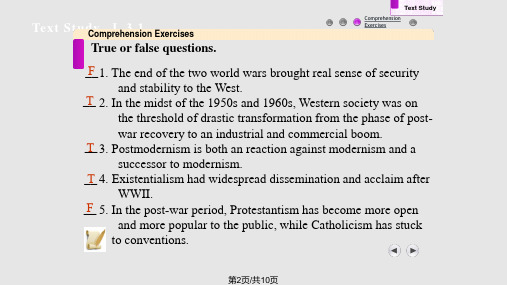
_F_ Press de France Nouvelle.
5. Jazz was initially influenced by two kinds of Negro music: ragtime and blues.
_T_
第8页/共10页
Text Study
Text Study _4_3333 Comprehension Exercises
Text Study
Comprehension Exercises
Multiple choice.
(1) Impressionism got its name from ________famous painting Impression: Sunrise.
A. Pissarro’s B. Monet’s C. van Gogh’s D. Paul Gauguin’s
Hofmann, who benefited from the movements like cubism,
_fa_u_v_i_s_m_ and expressionism.
3. Action painting is a branch of a_b_s_t_ra_c_t_e_x_p_r_e_s_s_io_n_is_m__ .
Comprehension Exercises
Fill in the blanks.
1. _N_e_w__Y_o_rk__ became a new centre of world art during and after
the WWII, taking over from Paris.
2. One of the representative of abstract expressionism is Hans
西方文化导论课件Unit
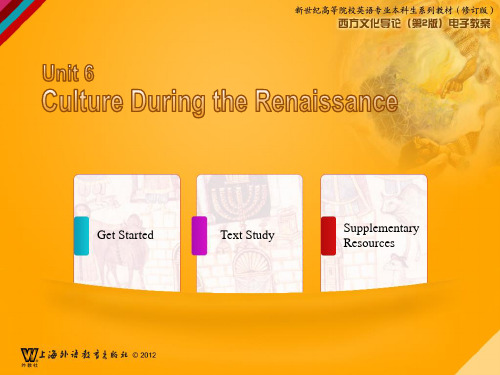
(1) Italy’s prosperous trade and production of handicraft, which furnished a material basis for cultural development
Main Ideas
Main Ideas
Text Study
(2) its rich variety of urban social life coinciding with the emergence of more cities where manufacturing and commercial activities called for the vigorous development of cultural life
中世纪(Middle Ages)(约公元476年~公元1453年),是欧洲历史
上的一个时代(主要是西欧),自西罗马帝国灭亡(公元476年)到 东罗马帝国灭亡(公元1453年)的这段时期。这个时期的欧洲没有一 个强有力的政权来统治。封建割据带来频繁的战争,造成科技和生产 力发展停滞,人民生活在毫无希望的痛苦中,所以中世纪或者中世纪 早期在欧美普遍被称作“黑暗时代”,传统上认为这是欧洲文明史上 发展比较缓慢的时期。
Interpretation of Cultural Terms
Interpretation of Cultural Terms
Text Study
monastic chapter 教会或修道院管理处: a Christian administrative office within the church
Main Ideas
Main Ideas
Text Study
Factors that contributed to the emergence of the Renaissance:
西方文化导论(第二版)
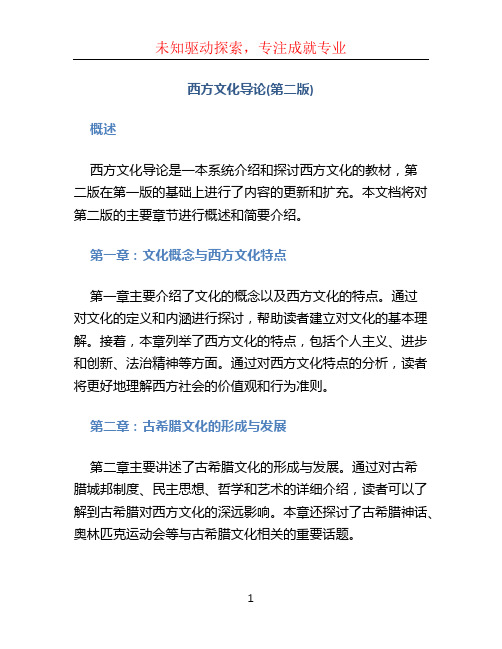
西方文化导论(第二版)概述西方文化导论是一本系统介绍和探讨西方文化的教材,第二版在第一版的基础上进行了内容的更新和扩充。
本文档将对第二版的主要章节进行概述和简要介绍。
第一章:文化概念与西方文化特点第一章主要介绍了文化的概念以及西方文化的特点。
通过对文化的定义和内涵进行探讨,帮助读者建立对文化的基本理解。
接着,本章列举了西方文化的特点,包括个人主义、进步和创新、法治精神等方面。
通过对西方文化特点的分析,读者将更好地理解西方社会的价值观和行为准则。
第二章:古希腊文化的形成与发展第二章主要讲述了古希腊文化的形成与发展。
通过对古希腊城邦制度、民主思想、哲学和艺术的详细介绍,读者可以了解到古希腊对西方文化的深远影响。
本章还探讨了古希腊神话、奥林匹克运动会等与古希腊文化相关的重要话题。
第三章:罗马文化的兴盛与衰落第三章主要介绍了罗马文化的兴盛与衰落。
通过对罗马帝国的建立、法律制度、建筑艺术等方面的讲解,读者可以了解到罗马文化的辉煌。
同时,本章还探讨了罗马帝国的衰落原因,包括内外因素的影响,为读者呈现了一个全面的罗马文化画卷。
第四章:基督教与中世纪文化第四章主要探讨了基督教与中世纪文化的关系。
通过对基督教教义、圣经、修道院制度等方面的介绍,读者可以更好地理解基督教对于西方文化的影响。
本章还讲解了中世纪文化的典型特征,包括封建制度、骑士精神等,为读者呈现了一个中世纪文化的全景图。
第五章:文艺复兴与人文主义第五章主要介绍了文艺复兴与人文主义运动。
通过对文艺复兴时期的艺术、文学、科学等方面的讲解,读者可以了解到文艺复兴对于西方文化的重要意义。
本章还探讨了人文主义的核心观点与价值观,为读者呈现了一个充满思想与创新的时代。
第六章:启蒙运动与近代西方文化第六章主要探讨了启蒙运动与近代西方文化。
通过对启蒙运动的起源、思想家以及影响的介绍,读者可以了解到启蒙运动对于近代西方文化的深刻影响。
本章还讲解了近代西方文化的主要发展特点,包括科学理性主义、人权思想等方面。
西方文化基础(最全版)PTT文档

文化的继承性可能带有间断性或连续性。
继承性是文化的基础。
校园文化 老年文化 A person must learn culture from other people in a society.
——英国人类学家 泰勒
小群体文化
知识
没文化Biblioteka 1. 文化的涵义各个领域学者的文化观:
¨文化是研究过去各个时代人的活动成果经物质化而 得到的各类事物
4) Cluture is adaptive. People use culture to flexibly and quickly adjust to changes in the world around them.
汉译
2. 文化的特征
2.1 文化的发展有 继承性。
假如每一个新生的人都必须一切从头学起:学习使用石器、发明语言、车轮、建造住房、积累科学和艺术知识等,人类只能徘徊在原
返回
2. 文化的特征
1) It is based on symbols — abstract ways of referring to and understanding ideas, objects, feelings, or behaviors — and the ability to communicate with symbols using language.
——考古学家
¨探讨一个民族的文化的全部多样性和完整性的表现 ——民族学家
¨文化是人的艺术活动及其结果 ——艺 术 家
1. 文化的涵义
文化,或文明,就其广泛的民族学意义来说,是 包括全部的知识、信仰、艺术、道德、法律、风 俗以及作为社会成员的人所掌握和接受的任何其 他的才能和习惯的复合体
西方文化导论Unit课件

B. In 1054 BC
C. In 1055
D. In 380
Comprehension Exercises
Multiple choice.
Text
Comprehensio n Exercises
Stud y
(2) In 451 AD, the archbishop of Roman Church, ____________, made himself Pope.
Text Stud y
Comprehension Exercises
Fill in the blanks.
Text
Comprehensio n Exercises
Stud y
(1) Owing to the repeated conquests of Jerusalem by various aggres_A_sl_oe_rx_sa_,_nl_idk_e__r_t_h_e__G_ reat _t_h_e__R_o__m__anasnd , the Jews suffered a great deal from the violent suppression and the final loss of their homeland.
A. Lutheran Church
B. Anglicanism
C. Presbyterian
D. Free Churches
Comprehension Exercise
Fill in the blanks.
Text
Comprehensio n Exercises
Stud y
(1) The New Testament contains altog_2_e7_ther
西方文化思想体系ppt课件

2 西方思想文化体系
2.3 西方文化体系历史
三、近代西方文化 这一时期发生的文艺复兴、宗教改革带来了人类思想大活跃,大解放,在这一时 期,其文化的主要精神是人文精神、个人主义、新教精神。
3、新教精神:宗教世俗化 宗教改革最重要的成果是世俗化,肯定了世俗生活的价值.或者一方面把宗教生 活世俗化,另一方面把世俗生活神圣化。这种世俗生活是指广大世俗信徒特别是 市民阶级的世俗活动,世俗化的结果是,无论宗教生活还是世俗生活都合理化了 ,这种合理化为新型的宗教伦理乃至资本主义精神的诞生创造了条件。
就中西文化的发生来说,应该是两种各自独立成长起来的产物,他们有各自的 原始土壤。因此,作为两种独立的文化体系,它们所表现出来的特点是截然不 同的。
西方,一词也包含着许多的概念,以政治概念为主,除了是一种地理方位的指 称以外,便是古代的“西天”、“西域”等作为行政划分而存在。到了现代, 由苏联为首的社会主义与美国为首的资本主义的两大阵营的对峙,“东西关系 ”、“东西阵营”等词语的出现,“西方”又成了资本主义的代名词。
4、自由精神 希腊精神,若用一个词来概括,那就是——自由 ,自由的精神。在世界上绝大多数国家或民族匍匐 在暴君专制的淫威下惶恐不安之时,古希腊人已经 走上了自主自治因而自由的道路。他们自由自在地 生活在爱琴海周围,好似那天中歌唱的小鸟。
BREAD PPT DESIGN
10
2 西方思想文化体系
2.3 西方文化体系历史
BREAD PPT DESIGN
14
2 西方思想文化体系
2.3 西方文化体系历史
四、现代西方文化精神
1、自由精神和自由主义 自由精神在西方历史上渊源久远,自由主义是近代以来西方许多国家立国的基础 ,也是支配性的精神。
美国文学导论课件
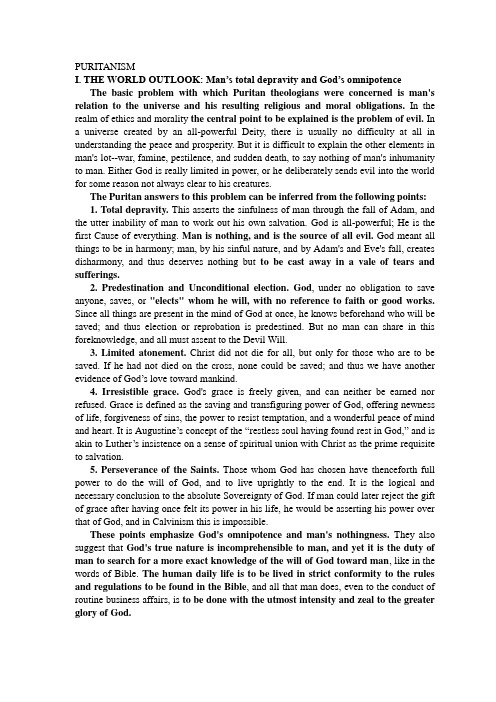
PURITANISMI. THE WORLD OUTLOOK: Man’s total depravity and God’s omnipotenceThe basic problem with which Puritan theologians were concerned is man's relation to the universe and his resulting religious and moral obligations.In the realm of ethics and morality the central point to be explained is the problem of evil. In a universe created by an all-powerful Deity, there is usually no difficulty at all in understanding the peace and prosperity. But it is difficult to explain the other elements in man's lot--war, famine, pestilence, and sudden death, to say nothing of man's inhumanity to man. Either God is really limited in power, or he deliberately sends evil into the world for some reason not always clear to his creatures.The Puritan answers to this problem can be inferred from the following points:1. Total depravity. This asserts the sinfulness of man through the fall of Adam, and the utter inability of man to work out his own salvation.God is all-powerful; He is the first Cause of everything. Man is nothing, and is the source of all evil.God meant all things to be in harmony; man, by his sinful nature, and by Adam's and Eve's fall, creates disharmony, and thus deserves nothing but to be cast away in a vale of tears and sufferings.2. Predestination and Unconditional election.God, under no obligation to save anyone, saves, or "elects" whom he will, with no reference to faith or good works. Since all things are present in the mind of God at once, he knows beforehand who will be saved; and thus election or reprobation is predestined. But no man can share in this foreknowledge, and all must assent to the Devil Will.3. Limited atonement. Christ did not die for all, but only for those who are to be saved. If he had not died on the cross, none could be saved; and thus we have another evidence of God’s love toward mankind.4. Irresistible grace. God's grace is freely given, and can neither be earned nor refused. Grace is defined as the saving and transfiguring power of God, offering newness of life, forgiveness of sins, the power to resist temptation, and a wonderful peace of mind and heart. It is Augustine’s concept of the “restless soul having found rest in God,” and is akin to Luther’s insistence on a sense of spiritual union with Christ as the prime requisite to salvation.5.Perseverance of the Saints.Those whom God has chosen have thenceforth full power to do the will of God, and to live uprightly to the end. It is the logical and necessary conclusion to the absolute Sovereignty of God. If man could later reject the gift of grace after having once felt its power in his life, he would be asserting his power over that of God, and in Calvinism this is impossible.These points emphasize God's omnipotence and man's nothingness.They also suggest that God's true nature is incomprehensible to man, and yet it is the duty of man to search for a more exact knowledge of the will of God toward man, like in the words of Bible. The human daily life is to be lived in strict conformity to the rules and regulations to be found in the Bible, and all that man does, even to the conduct of routine business affairs, is to be done with the utmost intensity and zeal to the greater glory of God.II. THE REFORMATION: Puritanism in EuropeThe abuses of the Church, particularly the issuing of indulgences and the imposition of all sorts of tithes, fees, and fines for ever-increased revenue, the spectacle of a divided papal authority, and the rise of humanism during and after the Renaissance, etc., these constitute the immediate background of the Reformation.1. Like Augustine and St. Paul, Martin Luther's approach to religion was based on the mystical experience of conversion, and he tended to distrust reason. His later challenge to the beliefs and institutions around him was based on the fact of a direct sense of the power of God to change completely the life of sinful man, and to fill him with a kind of spiritual joy in conforming to God's will.After a long and agonized spiritual struggle, he had arrived at his new-found sense of religious certainty. In short, the whole doctrine of the Church and the priesthood as the necessary intermediary between man and God had been tested and found wanting. In this rejection of clerical authority is contained the Lutheran idea of the universal priesthood of all believers.Luther, convinced that only a right personal relationship with God would bring salvation, preached vigorously against the abuse of indulgences.He specifically advanced the idea that "Every Christian who feels true compunction [for sin] has of right plenary remission of pain and guilt, even without letters of pardon." In a little pamphlet entitled On Good Works issued in May, 1520, he defined the noblest of all good works as the belief in Christ, and he further affirmed the essential goodness of the ordinary trades and occupations of everyday life. This denial of the narrow limitation of good works to alms-giving, fasting, prayers, or a life of unnatural asceticism gives further evidence of the boldness and originality of Luther's thinking, and was to have momentous consequences in the history of Protestantism.2. Huldreich Zwingli (1484-1531), the man most influential in spreading the Reformation in Switzerland, was by temperament intellectual and critical, in contrast to Luther's mystical nature, and in this he more nearly resembled Calvin, who was to come after him.Although substantially in agreement with Luther, he had arrived at his conclusions by the path of critical examination of the actual words of the Bible, and he was more inclined to emphasize the will of God than the sense of personal salvation through faith in Christ. An example...Zwingli charged that Luther's belief in the physical presence of Christ simultaneously at ten thousand communions was a remnant of medieval superstition, and denied the possibility on the logical grounds that a physical body could be in only one place at once.3. One of the oldest practices of the Christian church was that of infant baptism. But now arose the Anabaptists who said that they could find no authority in the Bible for this custom. The State they regarded as an unnecessary temporal authority interposed between man and God. Zwingli opposed the Anabaptists bitterly, but in one form or another this type of non-intellectual pietism, coupled with the idea of the self-governing congregation, was to be felt in far-off New England.4. Calvin was of the second generation of the Reformation. Calvin's work would not have been possible without that of his great predecessor. Calvin's genius was forformulation and organization. Calvin's approach to religion was also intellectual, rather than mystical or pietistic.Of Calvin's experience of conversion little is known, but there is no doubt that it was profound and lasting. From it he probably derived his belief in the irresistible nature of God's Grace and the famous Institutes, which he published in 1536.Based on a literal interpretation of the Story of Creation and the Fall of Adam as related in the Bible, Calvin's theological system is based on acceptance of the complete sovereignty of God, and of the ultimate inability of man to comprehend His true nature. Y et, since knowledge of God, and of himself is man's highest duty, he must constantly strive, through the lessons of nature and the revealed word of God in the Bible to achieve some measure of understanding. God is the source of all good, and obedience to God's will is to be absolute. Before the Fall, man was good, and capable of obeying God's will, but since then he has been incapable of goodness, or of influencing to the slightest degree by good works his election or reprobation. From this state of depravity some men are undeservedly rescued by the death of Christ on the cross; and since the sending of Christ into the world was a free act on God's part, it is thus an evidence of his love toward mankind.Like Luther, Calvin insisted on a personal sense of the workings of God's grace in the life of the individual. Y et these good works have nothing to do with being saved or cast away.The standard of conduct is the Bible. Man is saved to virtue, rather than by virtue.Calvin reminds his readers that "when they inquire into predestination, they penetrate the inmost recesses of Divine wisdom" and that "the careless and confident intruder...will enter a labyrinth from which he shall find no way to depart." The mystery of the workings of the Divine will is among "those things which the Lord has determined to be hidden in himself" and which "God would have us adore and not comprehend, to promote our admiration of his glory."There are many impure persons who will draw such a conclusion from the certainty that all men are ineluctably predestined for election or reprobation, irrespective of works or personal merit. Here again Calvin turns to Paul to admonish such wicked people. Even if a man could conceivably be convinced of his election, he should be all the more "awakened and stimulated to a cheerful practice of [virtue], rather than using [that knowledge] as a pretext for slothfulness."Calvinism differed from the Catholicism of the sixteenth century largely in its stark simplicity, and in its refusal to qualify or gloss over in anyway man's helplessness and depravity as compared with his awful Sovereign.Man existed only to glorify God in thought, word, and deed, and it was his highest duty to do so even though he might be predestined to reprobation like the veriest sinner of the flock. The Calvinist truly "prepared for the best, but expected the worst," and there has hardly been a more grimly realistic view of man's relation to the universe before or since.III. PURITAN RULE IN NEW ENGLAND, AMERICAThe Puritans were far from democratic in political philosophy. Calvin places emphasis on the Bible (the Old Testament) as law, and so Puritans in New England modeltheir society on a patriarchal and aristocratic concept of society. On the voyage to New England, John Winthrop, later to be governor of the Massachusetts colony, preached a sermon on A Modell of Christian Charity, which he prefaced with these words: "God Almighty in His most holy and wise Providence hath so disposed of the Condicioun of mankinde, as in all times some must be rich some poore, some high and eminent in power and dignities others meane and in subiecuon [subjection]."In colonial period, a Puritan's sense of responsibility to the congregation was strong. The more lowly members of the church were regarded as the spiritual charges of their religious and civil leaders, who were supposed to exercise a kindly, but firm supervision over their daily life. When administered with the proper humility, this system of control resulted in some of the most disinterested and high-minded leadership. But often, with the wrong persons in charge, such an intimate overseeing of one's private life could result in a narrow and petty moral censorship. This, certainly, gave rise to strong religious dissent, although the Puritans felt that the Dissenters were irresponsible enthusiasts, and the hand of persecution was heavy against Dissenters of all kinds.Thomas Hooker (1586-1647), a well-educated man of great force of character, dissatisfied with the too-rigid control exercised by the Salem church, led his flock to Hartford in defiance of authority, and set up his own somewhat more liberal form of Bible Commonwealth.Roger Williams (1604-1683), one of the most original and liberal thinkers of the first generation of colonists,touched the depths of heresy by stating flatly that the civil authorities had no right to punish persons for their religion opinions.The crux of the whole matter is: By what right did the Puritans, who themselves had come to the New World to establish liberty of conscience, deny that same right to any other earnest seeker after God's truth as revealed in the Bible? It was really Williams who was to be of great importance in undermining Puritan authoritarianism.Roger Williams was the true founder of our democratic ideals.As a devoutly religious man, his ideal community was one in which everyone should be so fired with the love of Christ (each in his own way), so intense in his own soul-searching that he felt compelled to search throughout life for the ultimate truth about God.Anne Hutchinson, a woman of vigorous and independent mind and considerably in advance of her times finally declared that she had received a new doctrine by divine inspiration.Mrs. Hutchinson was rebelling against the only authority there was, and her criticisms were the more exasperating to the Puritan ministers because they were based on the "inner light," rather than on theologically arguable grounds.IV. AFTER THE THEOCRACY: Reasons for the decline of PuritanismThus the great hour of the Puritans was of brief duration in New England.It had become obvious that the New World was not to be made up of a series of Bible Commonwealths, and that the religious fervor that had fired the first settlers was burning low. Cotton Mather, the third in line of God's deputies in New England, and Jonathan Edwards, one of the last generation of true Puritans in America, spent most of theirconsiderable energies in a vain attempt to rekindle the original fires of Puritan conviction and zeal, but failed.The reasons for their failure can be summed up as follows:1. The number of "unchurched" colonists had always been much greater.2. The relation between Puritanism and success in worldly affairs had been a paradoxical and actually impossible hard nut for Puritans to crack up.Work was one of the cardinal Puritan virtues. The Puritan was indeed baffled by a strange paradox: he must toil mightily for the glory of God, humbly accept the riches that resulted from it, and yet continue to regard this world as nothing more than a vale of tears through which the sinner must pass on his way to Heaven. Human psychology is naturally unsuited to remaining for long in such a delicate state of conflict. Finally, the whole fabric of Puritan theology, with its insistence on the complete depravity and helplessness of man, was brought sharply into question by the actual conditions of frontier life. The Puritans had come to regard increased wealth and material well-being as marks of God's favor, and in this way they were led into a moral confusion in which the acquisition of wealth became a "good work" in itself. The Puritans began to live well, dress well, and think it no sin to display outward evidence of God's favor. They believed that food and drink were intended by a gracious Providence for the comfort of mankind, and they advocated moderation rather than ascetic self-denial. The Puritans then saw no inconsistency between the acquiring of riches and the cultivation of an intense religious life. Indeed, even the earnest Calvinist, always on the watch for "signs of grace," could hardly help assuming that prosperity in business was a pretty sure indication of Divine favor. Quickly, though gradually, they deviated from the road taken by their fervent forefathers.3. The Puritans' emphasis on the need for a genuine experience of conversion led to an unhealthy degree of self-questioning and inward torment.This constant soul-searching, which Calvin had insisted on as part of the regenerate man's duty even after conversion, was obviously, though intended as a safeguard against moral backsliding, leaving a very negative effect on many simple, earnest people and reduced them to a state of neuroticism.4. The Puritan belief that every happening, however minute, was the direct result of God's working out of his purposes in the world prolonged the medieval habit of regarding even casual events of the day as signs, omens, and portents of God's will. But this tendency to be on the watch for revelations and miracles was proved superstitious before the scientific discoveries.5. Finally, Calvinism had located the principle of evil squarely in the heart of man, and at the same time had insisted on his utter inability to alter his predestined election or reprobation. This approach to the problem of evil made necessary the concept of a God so all-powerful and so arbitrary in the working out of His will as to seem inhuman in His remoteness and inaccessible by any ordinary means of prayer or intercession.。
西方礼仪文化unit 1 The Etiquette of Daily Personal Communication
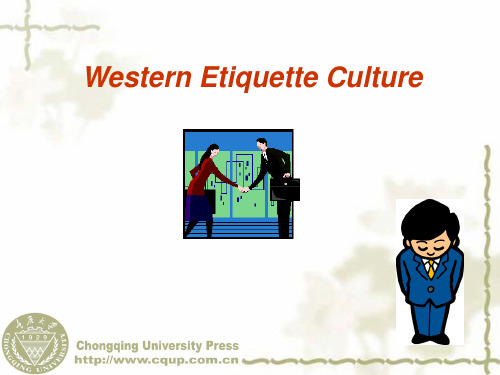
4. What’s the relationship between etiquette and culture
It goes without saying that etiquette is heavily dependent on culture; what is excellent etiquette in one society may be a shock in another. Etiquette evolves within culture. Etiquette can vary widely between different cultures and nations.
3. How did etiquette come into being?
Brief Introduction to Etiquette
originated in the French royal court during the 1600-1700's. deal with a serious problem. dissuade their unwanted behavior by posting signs called etiquets which warned them to "Keep off the Grass" . issue an official decree that no one could go beyond the bounds of the signs. the name "etiquette" was given to a ticket for court functions that included rules regarding where to stand and what to do.
- 1、下载文档前请自行甄别文档内容的完整性,平台不提供额外的编辑、内容补充、找答案等附加服务。
- 2、"仅部分预览"的文档,不可在线预览部分如存在完整性等问题,可反馈申请退款(可完整预览的文档不适用该条件!)。
- 3、如文档侵犯您的权益,请联系客服反馈,我们会尽快为您处理(人工客服工作时间:9:00-18:30)。
Comprehension Exercises
Multiple choice. (4) The Trojan War broke out at the end of ____.
Text Study
Comprehension Exercises
A. the Heroic Age B. the Golden Age C. the Cretan Civilization D. the Mycenaean Civilization
(1) Draco (2) Cleisthenes (3) Peisistratus (4) Solon (5) Pericles
a. supreme council check the behavior of leaders
b. punish trivial crimes with the death sentence
Text Study
Comprehension Exercises
_F_ (1) The play Oedipus at Colonus was written by Aristophanes. _F_ (2) Greek philosophy started with Aristotle. _T_ (3) The famous bronze sculpture of athletes, Discus Thrower,
Aristotle.
Comprehension Exercises
Multiple choice.
Text Study
Comprehension Exercises
(5) The first Olympiad began in the ____ period of the Golden Age.
A. archaic
B. central
c. abolish slave form e. advocate peasants’ welfare and
popular entertainments
Comprehension Exercise
True of false question.
Comprehension Exercises
Multiple choice.
Text Study
Comprehension Exercises
(1) ____ is the major foundation in the Western culture and makes a powerful impact on the development of human civilization.
A. the Neolithic Age B. the Bronze Age C. the Stone and Bronze Age D. the Old Stone Age
Text Study
Comprehension Exercises
Comprehension Exercises
Multiple choice.
Text Study
Comprehension Exercises
(3) Mycenaean culture was influenced the most by Cretan culture on ____.
A. farming
B. handicraft and trade
C. religion
D. philosophy
A. Ancient European culture
B. Ancient Greek culture
C. Ancient Chinese culture
D. Ancient Egyptian culture
Comprehension Exercises
Multiple choice. (2) Greek culture can date back to____.
was created by Myron. _F_ (4) Euclid discovered the ratio of radius of a circle and the
relationship between the volume and surface of a sphere. _T_ (5) The chief Greek philosophers are Socrates, Plato and
C. dependent
D. dark
Comprehension Exercises
Text Study
Comprehension Exercises
Please match the following names of political leaders to their reformist ideas.
